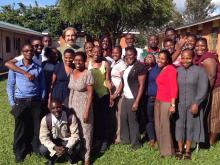
Igor Krnetic, PhD, is Assistant Professor at the University of Banja Luka, Bosnia and Herzegovina and a certified trainer in CBT. He also works in private practice and provide trainings in CBT, ACT and CFT at his Center for CBT in Banja Luka as well as in cooperation with other organizations in Western Balkans. More information can be found on his webpage www.krnetic.com/biografija.html. In the following article Igor provides a summary of his visit to Uganda where he delivered an Introductory ACT workshop
“I volunteered to go to Uganda in response to a request for ACT training that Roscoe Kasujja (a 2016 recipient of an ACBS Developing Nations Scholarship, and Lecturer at Makerere University, Kampala, Uganda) posted on the ACBS listserve on 28th Aug 2015. Soon Roscoe and I began corresponding - initially through email, and then via Skype. While connecting on Skype we both felt a professional and personal connection. This was because Roscoe put forward the needs of the community and I felt that I was in a position to respond to their needs. With comparative ease we began planning activities for my upcoming visit, and then over the next few discussions about the organization of the visit. Roscoe arranged accommodation for me at university and at the National Psychiatric Clinic Guest House. My visit to Uganda took place between the 9th and 20th of October.
Up on my arrival at Entebbe International Airport in Uganda, Roscoe and his colleague, Kizito, received and welcomed me to the country. This was a very warm and friendly reception. During the entire stay I felt very welcome and fully taken care of. Accommodation was basic but sufficient for the purposes of my visit.
In accordance with the agreed plan, during the first week of my stay I held a three-day introductory ACT training. The participants were students of psychology and psychiatry from Makerere University of Kampala. The students were from three programs at the School of Psychology including MA Counseling Psychology, MSc. Clinical Psychology, and the Post-graduate Diploma in Counseling. Psychiatry students who were based at the National Mental Referral Hospital also expressed interest in attending the training and were invited to attend.
My impression, based on feedback during and throughout the training, was that most of the students acquired knowledge and experience of the basic ACT and RFT processes. It was also clear that the students liked ACT and RFT concepts. In fact, most of them were eager to start applying ACT during and within their sessions not only as part of their daily work, but also their lives.
The training consisted of an introduction to the basic concepts of ACT with very little didactic presentation and many interactive and experiential exercises, led through personal examples from my life, which I modeled so that participants were also encouraged to share examples from their lives in line with the present ACT concepts. We used a lot of exercises in groups of three, referring to the therapeutic relationship during the first day of the training. The last day of training was related specifically to the application of acquired knowledge and experience through experiential training methods that I called “Mindful Peer Counseling Supervision”. I believe that this is an especially suitable method for teaching and guiding ACT beginners while providing ACT treatment during the peer counseling under direct supervision in real time. Through peer counseling supervision that was delivered during the training, participants were mindfully and compassionately guided to work flexibly with ACT processes and to make moment-to-moment decisions on why and when to use which ACT processes in treatment. The format of this peer counseling supervision is not a role-play, helped to provide attendees with opportunities to experience ACT processes from a client perspective.
Over the weekend we spent time hanging out and resting. We had a chance to visit the source of Nile, which for me was an unforgettable experience. Once again, Roscoe and Kizito were extremely kind and caring hosts.
During the second week of my stay in Uganda I held a group supervision and consultation meeting with Roscoe’s ACT group (that consisted of people who had been applying ACT in practice), as well as participating as a co-therapist in several therapy sessions with Roscoe”.
To help the ACBS to support the development of clinicians and researchers who are working to build capacity for mental health services in low and middle-income countries, please consider donating to the ACBS Developing Nations Fund at the following link:
https://contextualscience.org/developing_nations_fund
Ross White
Chairperson of ACBS Developing Nations Committee
